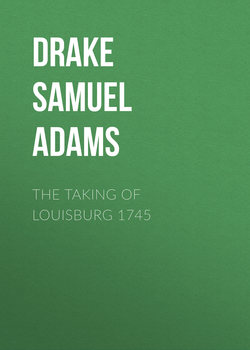Читать книгу The Taking of Louisburg 1745 - Drake Samuel Adams - Страница 4
IV
RÉSUMÉ OF EVENTS TO THE DECLARATION OF WAR
ОглавлениеWe will now rapidly sketch the course of events which led to war on both sides of the Atlantic.
Colonists provided for.
Having been obliged to surrender Nova Scotia and Newfoundland, the French court determined to make use of their colonists in those places for building up Louisburg.
Acadians will not emigrate.
In the first place, M. de Costebello, who had just lost his government of the French colony of Placentia, in Newfoundland, under the terms of the treaty, was ordered to take charge of the proposed new colony on Cape Breton, and in accord also with the provisions of that treaty, the French inhabitants of Newfoundland were presently removed from that island to Cape Breton. But the Acadians of Nova Scotia who had been invited, and were fully counted upon to join the other colonists, now showed no sort of disposition to do so. In their case the French authorities had reckoned without their host. These always shrewd Acadians were unwilling to abandon the fertile and well-tilled Acadian valleys, which years of toil had converted into a garden, to begin a new struggle with the wilderness in order to carry out certain political schemes of the French court. Though patriots, they were not simpletons. So they sensibly refused to stir, although their country had been turned over to the English. In this way the French authorities were unexpectedly checked in their first efforts to secure colonists of a superior class for their new establishment in Cape Breton.
How strange are the freaks of destiny! Could these simple Acadian peasants have foreseen what was in store for them at no distant day, at the hands of their new masters, who can doubt that, like the Israelites of old, driving their flocks before them, they too would have departed for the Promised Land with all possible speed?
A Thorn in the Side of the English.
Finding them thus obstinate, it was determined to make them as useful as possible where they were, and as a reconquest of Acadia was one of those contingencies which Louisburg was meant to turn into realities, whenever the proper side of the moment should arrive, nothing was neglected that might tend to the holding of these Acadians firmly to their ancient allegiance; to keeping alive their old antipathies; to arousing their fears for their religion, or to strongly impressing them with the belief that their legitimate sovereign would soon drive these English invaders from the land, never to return. For the moment the king’s lieutenants were obliged to content themselves with planting this thorn in the side of the English.
Why called Neutrals.
Acting upon the advice of the crafty Saint Ovide, De Costebello’s successor, the Acadians refused to take the oath of allegiance proffered them by the British governor of Nova Scotia – though they had refused to emigrate they said they would not become British subjects. When threatened they sullenly hinted at an uprising of the Micmacs, who were as firmly attached to the French interest as the Acadians themselves. The governor, therefore, prudently forbore to press matters to a crisis, all the more readily because he was powerless to enforce obedience; and thus it came to pass that the French inhabitants of Nova Scotia, under English dominion, first took the name of neutrals.
Victims to French Policy.
Perceiving at last how they were being ground between friend and foe, the Acadians began hoarding specie, and to leave off improving their houses and lands. A little later they are found applying to the Governor-General of Canada for grants of land in the old colony, to which they might remove, and where they could dwell in peace, for they somehow divined that they must be the losers whenever fresh hostilities should break out between the French and English, if, as it seemed inevitable, the war should involve them in its calamities. But that astute official returned only evasive answers to their petition. His royal master had other views, to the successful issue of which his lieutenants were fully pledged, and so it is primarily to French policy, after all, that the wretched Acadians owed their exile from the land of their fathers. What followed was merely the logical result.
But in consequence of their first refusal to remove to Louisburg only a handful of the Micmacs responded to Costebello’s call, by pitching their wigwams on the skirt of the embryo city.
Laborers from the Galleys.
Laborers were wanted next. For the procuring of these the Governor-General of Canada, the Marquis de Vaudreuil, hit upon the novel idea of transporting every year from France those prisoners who were sentenced to the galleys for smuggling. They were to come out to Canada subject to the severe penalty of never again being permitted to return to their native land, “for which,” said the cunning marquis, “I undertake to answer.”
Lord Bacon, in one of his essays, makes the following comments upon this iniquitous method of raising up colonies: “It is a shameful and unblessed thing,” he says, “to take the scum of people, and wicked condemned men to be the people with whom you plant; and not only so, but it spoileth the plantations; for they will ever live like rogues, and not fall to work, but be lazy, and do mischief and spend victuals: and be quickly weary, and then certify over to their country to the discredit of the plantation.”
